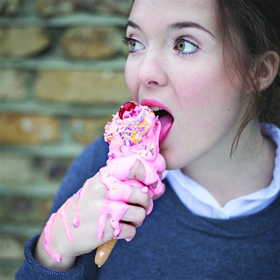Review: BUNNY, Tristan Bates Theatre

![]() Fabricate Theatre is debuting at Tristan Bates Theatre with Bunny, Jack Thorne's 2010 play. Directed by Lucy Curtis and performed by Catherine Lamb, the revival is sharp and eye-opening, and as relevant now as it was when the piece first premiered at Edinburgh Fringe Festival - if not even more.
Fabricate Theatre is debuting at Tristan Bates Theatre with Bunny, Jack Thorne's 2010 play. Directed by Lucy Curtis and performed by Catherine Lamb, the revival is sharp and eye-opening, and as relevant now as it was when the piece first premiered at Edinburgh Fringe Festival - if not even more.
The narration is lead by Katie, an 18-year-old girl from Luton who, when her 24-year-old boyfriend Abe is involved in an altercation with a younger man in the middle of the street, finds herself following him and his friends on a revenge attack.
As Katie tries to find her place in the world, in a single afternoon she understands how easy it is to go down the wrong path and how complicated life can be when you're a young woman surrounded by wolves.
Lamb is a force of nature with Thorne's script. Alone on the stage, she manages to engage the audience's imagination aided only by a low armchair and the power of Katie's stream of consciousness. She tames the award-winning playwright's words and makes them her own, transforming the crowd into her best friend and confidante.
The tendency to interrupt her own train of thought with intrusive ideas, often seemingly completely unrelated but correlated to what's important to her, makes the character truly alive. Images of her chilling adventure are interrupted by her life at home and her inherent need to rebel.
It's this jumping back and forth between topics that enables Lamb to showcase her micro-expressions, effectively turning her performance into an acting masterclass. Curtis's direction, combined with Angela Gasparetto's contribution as Movement Director, helps what could otherwise become a static monologue.
They have Lamb bouncing, walking, and running around the stage, managing to avoid her looking awkward or forced. The actress embodies the spirit of teenage years, portraying a frenzy that comes with slowly being welcomed into the adult world. Wanting to be accepted makes her tag along when Abe's friends Asif and Jake (one Asian and one white man, as Katie stresses multiple times) decide to take the matter in their hands.
Thorne decides to show the sense of community (and internalised racism) in a peculiar and rather horrifying way: by simply having a name and a general area, Asif manages to get his mates to track the kid down. Their showing up at his house coronates Katie's undoing and has her second-guessing the experience.
"I really don't know how to bring up the whole race thing" she says in regard to not telling her parents that Abe is black. However, Katie's political correctness lies only in her relationship with racial issues. She tiptoes around the subject, letting the audience understand that her own family frown upon the increasing numbers of foreigners, and so Luton and its people become characters themselves.
Lucy Weller's set design is accessible and minimalistic, an armchair becomes a car and fluffy clouds light up in line with Katie's feelings. Her lighting design is also essential from a visual point of view: by having Lamb moving in and out of different spotlights, she transports the character through time and space, efficiently explaining the changes to the audience.
A coming-of-age story far from a cautionary tale, told without frills and open to interpretation, Bunny acquires even more meaning in light of recent events. Luton becomes universal, and Thorne's originally specific setting opens up and embraces a new and multicultural England.
Katie's story isn't limited to her town anymore, and it feels like she's silently screaming at the audience to open their eyes, see beyond the black box of the Tristan Bates and to stop blurring the lines around harassment and diversity.
Bunny runs at Tristan Bates Theatre until 27 February.
Reader Reviews
Videos

